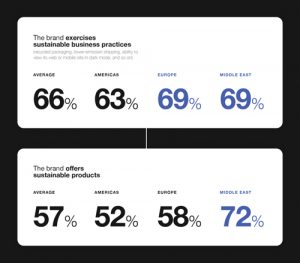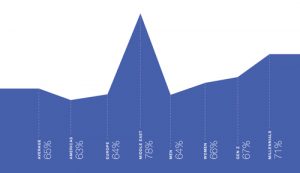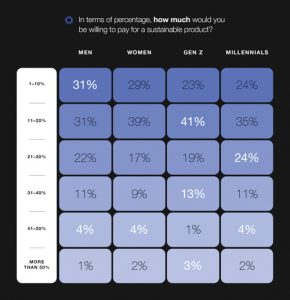2022 was a record year for extreme climate events. From a deadly hurricane off the Atlantic coast to torrential rains and melting glaciers in Pakistan to Europe’s record-high temperatures not seen in nearly 500 years, these events are becoming increasingly prevalent. And global consumers have no illusions regarding the threat climate change poses in the long term.
 Astound Commerce deployed a survey to 1,000 global consumers from the Americas (Canada, Mexico, and the United States), Europe (Germany, Italy, the Netherlands, Switzerland, and the United Kingdom), and the Middle East (the Kingdom of Saudi Arabia and the United Arab Emirates) to obtain an understanding of how consumer behaviours related to sustainability have evolved and how they will shape the future of commerce. The results clearly underscore the reality that brands must do their part to help curb the growing global threat.
Astound Commerce deployed a survey to 1,000 global consumers from the Americas (Canada, Mexico, and the United States), Europe (Germany, Italy, the Netherlands, Switzerland, and the United Kingdom), and the Middle East (the Kingdom of Saudi Arabia and the United Arab Emirates) to obtain an understanding of how consumer behaviours related to sustainability have evolved and how they will shape the future of commerce. The results clearly underscore the reality that brands must do their part to help curb the growing global threat.
Respondents to the 2021-2022 Global Risks Perception Survey from the World Economic Forum rated climate change inaction “as the risk with the potential to inflict the most damage at a global scale over the next decade.” Human health will bear the brunt of this damage in the form of disrupted food systems, diminished air and water quality, uninhabitable regions, and more, as global temperatures continue to rise without action. Consumers feel the magnitude of this crisis, and they want brands to act now.
CONSUMERS ARE WATCHING
Three out of five global consumers indicate that the public position a company takes on the environment and/or climate change has had at least some impact on their decision to buy or not buy from a brand.
Gen Z consumers are the most influenced by a brand’s stance on environmental issues, at 62 percent. These conscious consumers are using their purchasing power to advocate for climate action, indicating that brands need an authentic, transparent environmental messaging strategy. Transparency is key, as consumer attitudes are rapidly shifting to meet this urgent issue and brands that don’t back up their words with actions may face consumer contempt.
 RECOMMERCE
RECOMMERCE
Another solution to the growing emphasis on environmental sustainability in the broader consumer goods industry is recommerce, or the sale of previously worn or used products. Broadly, recommerce can help brands extend the life cycle of their products, reduce waste, and solidify their commitment to sustainability. The recommerce market has experienced a significant boom in recent years, thanks in part to innovative startups and resale sites.
Statista projects the value of the secondhand apparel market to more than double in size in the next few years, reaching US$218 billion in 2026 and making it a powerful potential revenue driver for apparel brands. It can also provide brands with an opportunity to resell returned products in an effort to curb the amount of unwanted inventory that ends up in landfills the world over. And consumers show strong interest in recommerce, with 54 percent saying they are at least somewhat interested in this sustainable model, led by 59 percent of Millennials.
70 percent of Millennial consumers consider a brand’s business practices at least somewhat important when shopping online. When highlighting your brand’s measures to operate in a more sustainable way, it’s crucial to ensure your actions speak louder than words, or consumers may interpret your efforts as greenwashing or conveying misleading information.
The implications of greenwashing can be dire with potential reputational damage and a loss of consumer trust as a result. Maintaining transparency as you make progress toward your environmental goals should be inherent to your sustainability strategy.
 THE VALUE OF SUSTAINABILITY
THE VALUE OF SUSTAINABILITY
Even as record-high inflation persists and the threat of a global recession looms, consumers understand the value of sustainable products and are willing to shoulder some of the costs associated with producing products in a more socially responsible way. A majority of global consumers say they would be willing to pay more for a sustainable product, led regionally by 78 percent in the Middle East and demographically by 71 percent of Millennials.
WHY SUSTAINABILITY MATTERS
As extreme weather events become more common, the growing effects of climate change are now more apparent than ever. Beyond the potential loss of life, damage to property and critical infrastructure, and the economic implications, these global catastrophes are permanently shifting consumer attitudes and behaviours.
As temperatures rise, more areas of the planet are becoming uninhabitable, causing mass migrations, and the impact on wildlife, agriculture, and our water supply may soon be irreversible. Everyone must be engaged in this shared mission toward a more sustainable future. Bold, innovative, and urgent action is needed, and while individual consumers are doing their part, collectively they expect brands to act now. Bottom line: sustainability can boost your bottom line, serve as a competitive advantage, and most importantly preserve the planet for future generations.




